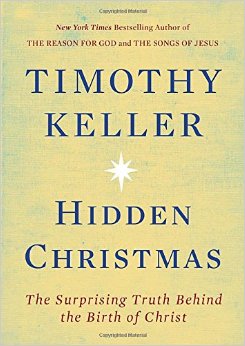Hidden Christmas:
The Surprising Truth Behind the Birth of Christ
by Timothy Keller
Review by Teri Hyrkas
It seems to be true that the best place to hide something is out in the open, in a very public venue. This is the case with Christmas, says Timothy Keller in Hidden Christmas: The Surprising Truth Behind the Birth of Christ (Viking 2016). In the introduction to his book, Keller, pastor of Redeemer Presbyterian Church in New York City, NY, states that Christmas “is the only Christian holy day that is also a major secular holiday — arguably our culture’s biggest.” The public/secular celebration of Christmas shares many of the same ideas related to the Christian holy day, says Keller, such as light in the darkness, giving gifts to those in need, and trusting in a better future. The author writes, “These are powerful themes, but every one of them is a two edged sword… Every year our increasingly secular Western society becomes more unaware of its own historical roots….Yet once a year at Christmas these basic truths become a bit more accessible to an enormous audience.”
How can the hidden meaning of Christmas be made more discernable to an uninformed public? In his book Keller makes use of the numerous signs of the season, especially light, music, and the Nativity story, to reveal the message of Christmas. Keller also says: “We will look at passages of the Bible that are famous because they are dusted off every Christmas, at the one moment every year when the secular society and the Church are, to a degree, thinking about the same thing.”
Keller notes that one of the famous passages of scripture that non-Christians hear during the Christmas season is from Handel’s Messiah. It is Isaiah 9:2 (NIV), “The people walking in darkness have seen a great light; on those living in the land of deep darkness a light has dawned.” From this verse the author suggests that people conclude: “Things are dark but we believe we can end that darkness with intellect and innovation…” Keller asks, “Can we?” A quote from the late Vaclav Havel, a Czech writer, philosopher, and statesman, is offered as an answer this question: “‘Pursuit of the good life will not help humanity to save itself, nor is democracy alone enough,'[Havel said.] ‘A turning to and seeking of… God is needed.”‘ The human race constantly forgets, he added, that “he is not God.”
As Keller walks us through the story of the birth of Christ, he directs our attention to various characters who are not in the limelight of the Nativity but who deserve our attention; one of those is Joseph, Mary’s husband. “When most people think of the angels at Christmas, they remember that these messengers came to the shepherds and to Mary. They often forget that an angelic herald also came to Joseph, who learned things no one else was told. Matthew 1:18-23 gives us this invaluable account, from which we learn that Jesus is God, that he is human, and that he is with us.”
In the angelic visit, Joseph is reassured that Mary’s explanation of her pregnancy is true, that she has indeed conceived a child by the Holy Spirit, and that Joseph should not be afraid to take Mary as his spouse. Joseph is also told that the baby will be called Jesus. To Joseph’s great credit he believes Mary and the angel, and takes Mary as his wife despite the fact that he will have to face the scorn of the community. Keller asks, “What is the application to us? If you want Jesus in your life, it is going to take bravery.”
In a fascinating section of the book called “The Gospel Story Changes How We Read Other Stories,” Keller compares the gospel story of the coming of Jesus to other heroic stories of redemption, specifically fantasies, myths and other fictional tales. There is a deep seated hunger in humans that cries out for happy endings says Keller. “[There are these desires] to experience the supernatural, to escape death, to know love that we can never lose…” Thus, even in our present age of technology and realism, fantasy tales remain popular. How, then, is the Christmas story perceived when it contains many supernatural events: a host of angels, a magnificent star, even a virgin birth? Might readers think of Matthew’s book, “Another delightful legend!” No, says Keller, because the gospel writer Matthew firmly plants Jesus in history, not in fantasy, by beginning his book with Christ’s genealogy. The Christmas story is not “once upon a time,” writes Keller, rather, “Jesus has come from the eternal, supernatural world that we sense is there, that our hearts know is there even though our heads say no. At Christmas, he punched a hole between the ideal and the real, the eternal and the temporal, and came into our world.”
Keller’s writing style, as in his many other books, is inviting, refreshing and insightful. Hidden Christmas is not simply a book about the annual celebration of Christ’s birth, it is an apologetic treatment of the Nativity, an explanation of who Jesus is and why he came to earth. In his approachable and winsome way, Keller explains in Hidden Christmas that Jesus is the Son of God who was born to save us from our sins and restore our relationship with our Heavenly Father. This is the meaning of Christmas that is hidden in plain sight today and the message Keller wants everyone to hear, especially those who celebrate Christmas but don’t know why.

